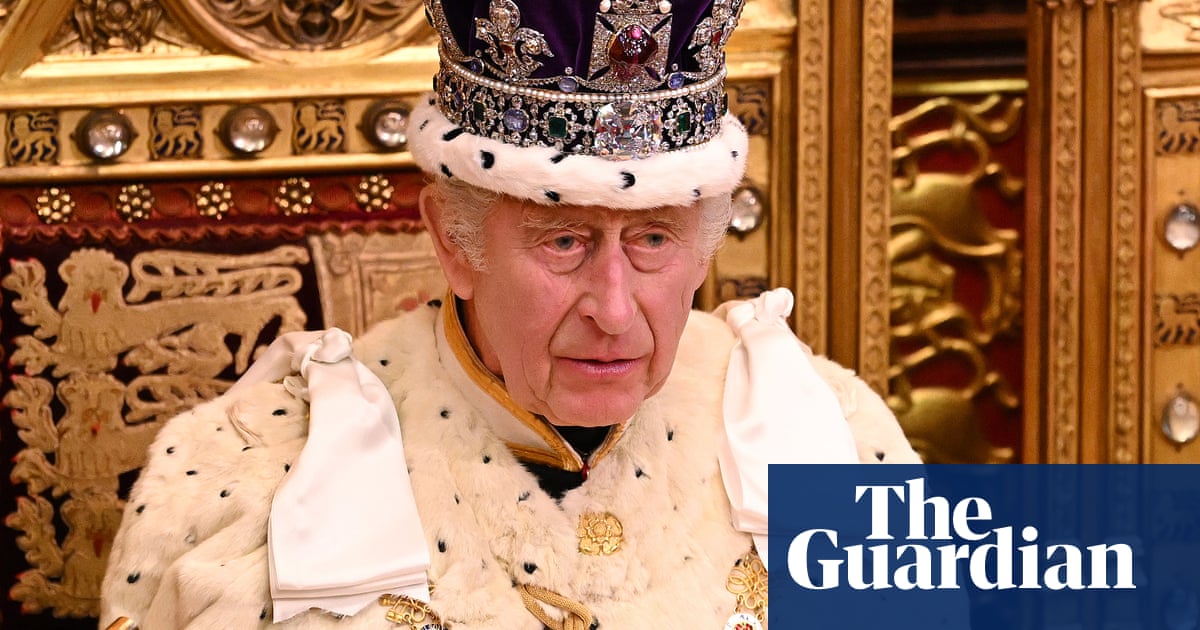
King Charles has delivered his first king’s speech, outlining the UK government’s plans for laws to create potential dividing lines with Labour before the next general election with a tough approach to criminal justice and the green agenda, but little legislation to improve Britain’s struggling public services.
The king paid tribute to his mother the late Queen Elizabeth’s “legacy of service and devotion” as he conducted the state opening of parliament for the first time as monarch.
The government announced 21 bills for what is almost certainly the final session of parliament before voters go to the polls, including seven which were carried over, such as the renters reform bill and a law banning British public bodies from boycotting Israel.
With crime and justice a major point of contention with Keir Starmer’s Labour party, the speech confirmed ministers would bring forward bills covering sentencing laws, police powers and the treatment of victims of crime.
A sentencing bill will mean those convicted of the most serious sexual offences will not be allowed to leave prison early, and will also introduce a new presumption that anybody sentenced to less than 12 months will have their sentence suspended.
A criminal justice bill will introduce new powers for police to make defendants attend their sentencing hearings, including adding two years to their sentences if they refuse to comply. This follows the case of the nurse Lucy Letby, who refused to be sentenced in person after being found guilty of killing children.
One mooted change that was not included in the speech was a ban on tents for homeless people, a measure that was reported over the weekend but triggered a backlash even from Conservative backbenchers.
An annual system for awarding oil and gas licences was announced, with the government saying it would protect jobs and bolster energy security. Experts, including climate scientists and poverty campaigners, have warned against plans to keep drilling.
New oil and gas fields in the North Sea would only produce enough gas to satisfy Britain’s needs for a few weeks a year and have minimal impact on energy security, while the energy secretary, Claire Coutinho, has admitted that household energy bills may not come down as a result of the plans. Labour would block new domestic exploration licences if it wins power.
While public services including health and education were mentioned in the speech, there was no new legislation to either reform the NHS or to bring in Sunak’s plans to replace A-levels and T-levels with a new single “advanced British standard” qualification.
The only health-related bill would introduce a gradual “generational” ban on smoking and “crack down” on vapes for children, despite promises last year of a major piece of legislation to modernise the Mental Health Act.
However, Michael Gove, the housing secretary, will bring forward two of his long-promised reform packages, one to give renters extra rights and one to protect leaseholders. Both, however, have been watered down in significant ways.
Ministers will now not ban no-fault evictions until they have established a new court process to hear disputes, after landlords warned that disputes could choke the courts. And while they will ban developers from selling houses under leasehold, they will not extend that ban to flats, which make up 70% of all leasehold properties.
One measure likely to trigger controversy is Gove’s ban on public bodies implementing boycotts on countries that are not subject to sanction by the national government. The move is designed to stop councils enacting boycott and divestment campaigns against Israel, and has caused anger among some Tories, who believe it gives special treatment to the Israeli government.
A law to change the structure and operation of the railways in Britain by setting up a new body, Great British Railways, to control and manage all aspects of the railways, was only in “draft” form, meaning it is unlikely to happen before the next election.
There was also legislation on self-driving vehicles, with buses, grocery deliveries and farm machinery potentially operating autonomously by the end of the decade.
The speech included legislation so Britain can formally join the 11-member strong Indo-Pacific trade bloc that includes Japan and Australia. The government says the deal secures access for British exporters to 500 million people and will cut tariffs on exports of food, drink and cars.
Some trade experts said joining the bloc would harm the UK’s ability to rejoin the EU at a later date, arguing that harmonising trade rules with the Comprehensive and Progressive Agreement for Trans-Pacific Partnership countries would drive a wedge between Brussels and London.
The speech set out plans to abolish a key piece of press regulation law, which will result in the rolling back of a law that left newspapers liable for the legal costs of both sides in libel cases, regardless of the result. There will also be increased regulation of streaming services, giving the regulator Ofcom the authority to consider complaints about shows on Netflix and Disney+.
https://news.google.com/rss/articles/CBMie2h0dHBzOi8vd3d3LnRoZWd1YXJkaWFuLmNvbS9wb2xpdGljcy8yMDIzL25vdi8wNy9raW5nLWNoYXJsZXMtc2V0cy1vdXQtc3VuYWtzLWVsZWN0aW9uLWRpdmlkaW5nLWxpbmVzLWluLWZpcnN0LWtpbmdzLXNwZWVjaNIBe2h0dHBzOi8vYW1wLnRoZWd1YXJkaWFuLmNvbS9wb2xpdGljcy8yMDIzL25vdi8wNy9raW5nLWNoYXJsZXMtc2V0cy1vdXQtc3VuYWtzLWVsZWN0aW9uLWRpdmlkaW5nLWxpbmVzLWluLWZpcnN0LWtpbmdzLXNwZWVjaA?oc=5
2023-11-07 12:41:45Z
2581118037
Tidak ada komentar:
Posting Komentar